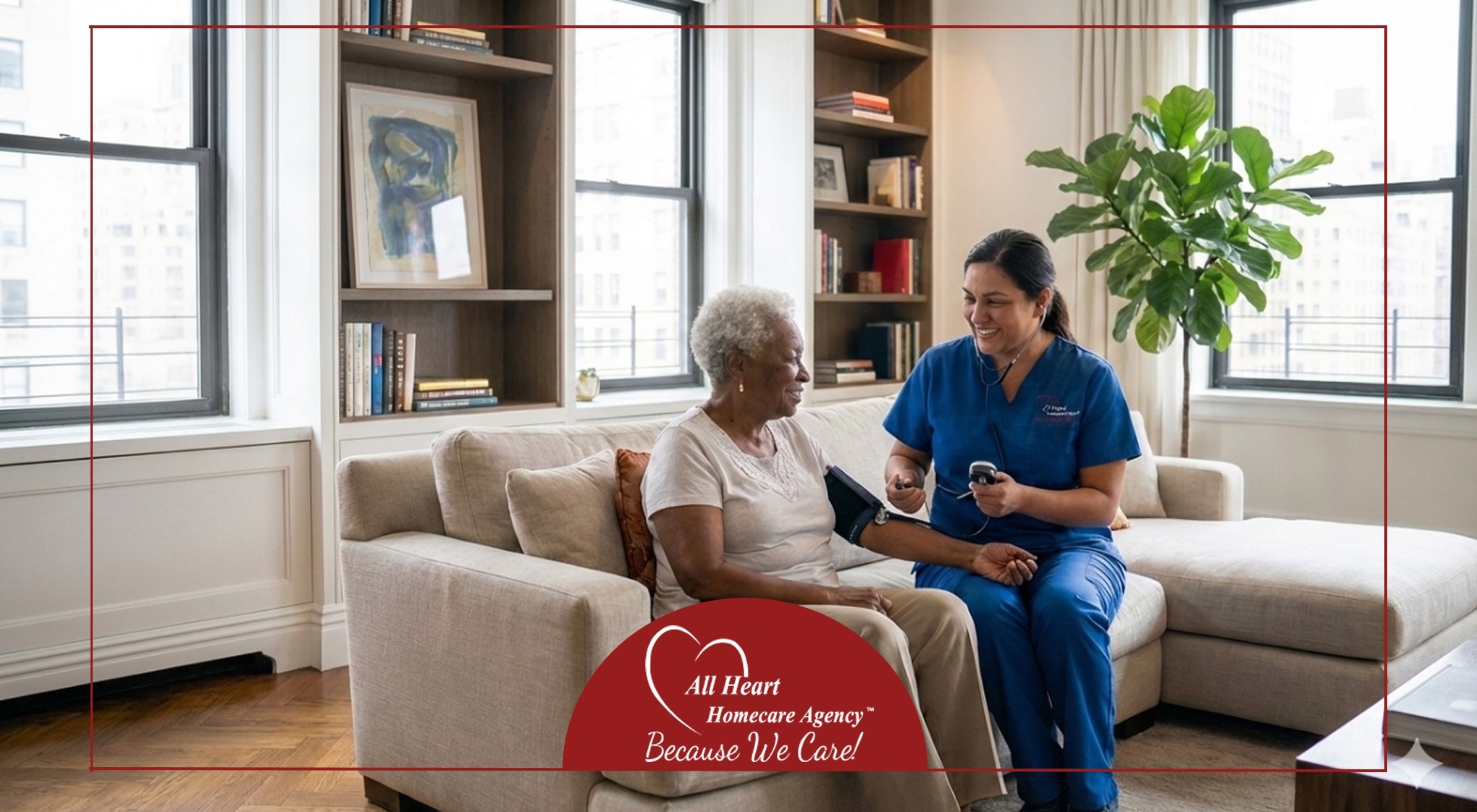What does home care for someone with a traumatic brain injury (TBI) involve?
Home care for someone with a traumatic brain injury focuses on structure, consistency, and personalized support tailored to how that individual’s brain has been affected. Care often includes help with daily routines, supervision for safety, mobility support, medication reminders, and cognitive or behavioral assistance. Because TBI recovery and long-term needs vary widely, in-home care allows caregivers to adapt day by day, supporting progress while reducing stress and overstimulation. For many families, this personalized approach makes recovery or long-term management more manageable at home.
A Moment That Changes Everything
Imagine a father who once lit up every family gathering, now struggling to find the words for simple sentences or recall the name of his favorite song. A traumatic brain injury (TBI) affects so much more than just the person who’s injured—it touches every member of their family. Whether caused by a car accident, a fall, or a stroke, the journey to recovery can feel long and overwhelming. But you’re not alone, and with patience, care, and support, healing is possible—one step at a time.
For these individuals, home care becomes a lifeline. It offers not just medical support but also the comfort of being surrounded by familiar faces and a familiar environment—an essential part of healing. If you’re caring for someone with a TBI, or if you’re a healthcare professional exploring options for in-home care, this blog will help you understand how tailored home care can make a difference, the types of services available, and how All Heart Homecare Agency can support your loved one on their recovery journey.
What is a Traumatic Brain Injury (TBI)?
A traumatic brain injury (TBI) occurs when a sudden impact disrupts the brain’s normal functions. TBIs can range from mild concussions to severe injuries that cause long-term physical and cognitive impairments. Common causes include car accidents, strokes, sports injuries, and falls, especially among older adults.
How Does TBI Affect Daily Life?
The effects of TBI vary based on the severity of the injury, but they often include challenges such as:
- Difficulty with memory and concentration
- Physical limitations, like reduced mobility or motor skills
- Emotional challenges, including mood swings or depression
- Challenges in communicating effectively
Each of these hurdles makes day-to-day tasks feel overwhelming. This is why many families explore the benefits of in-home care support for their loved ones.
In-home care can provide compassionate and dedicated support for individuals with TBI. Caregivers are trained to assist with daily tasks, such as meal preparation, medication reminders, and personal hygiene. They can also help with household chores and transportation to appointments or social activities. This level of support allows individuals with TBI to focus on their recovery and reduces the strain on family members who may be struggling to balance caregiving responsibilities with other commitments.

The Role of Home Care in TBI Recovery
Home care provides personalized solutions designed to meet the specific needs of individuals with TBI. Unlike generic care models, TBI home care services ensure that patients receive support tailored to their physical, emotional, and cognitive challenges.
Tailored Care Plans
No two brain injuries are the same. A comprehensive home care plan considers the unique recovery goals of the patient, taking into account their limitations and potential. From mobility assistance to cognitive exercises, every plan is designed to optimize progress.
Daily Living Support
Simple tasks like preparing meals, bathing, or navigating stairs can become monumental challenges for TBI patients. Home care professionals step in to help with these daily living activities, allowing patients to focus on recovery while maintaining dignity and independence.
Emotional Support
The emotional toll of a traumatic brain injury can be immense, both for the patient and their loved ones. Home care professionals provide compassionate support to help manage emotions and cope with the changes in daily life. This includes creating a safe and comfortable environment, as well as offering companionship and listening ears during difficult times.
Additionally, home care professionals may also coordinate with mental health therapists or counselors to ensure that the patient receives comprehensive emotional support during their recovery journey. They understand that healing involves not just physical rehabilitation, but also addressing any psychological effects of the injury.
Family Education and Training
For many patients, having family members involved in their recovery process is crucial for long-term success. Home care professionals can provide education and training to family members on how to best support their loved one during the rehabilitation process. This may include teaching them proper techniques for assisting with daily tasks, providing emotional support, and creating a safe and comfortable environment at home.
Furthermore, home care professionals also offer guidance on how to prevent future injuries and maintain overall health and well-being. They may educate families on the importance of nutrition, exercise, medication management, fall prevention, and other aspects of healthy living. By involving the patient’s family in their care plan, home care professionals help create a supportive network that promotes long-term recovery and wellness.
Cognitive and Emotional Assistance
The mental health impact of TBI is often overlooked. Home care teams provide emotional support, helping patients manage anxiety, frustration, and social isolation. Cognitive rehabilitation exercises can also be integrated to aid memory, problem-solving, and other brain functions.
Types of Services Offered
When it comes to traumatic brain injury home care in New York, here are some of the specialized services families can expect for their loved ones.
Personal Care Aides
Trained professionals assist with essential activities like dressing, grooming, and transferring safely from bed to chair.
Occupational & Speech Therapy Coordination
Many TBI patients require advanced therapy to regain lost skills. Home care teams coordinate with therapists to bring these services directly to the patient’s home.
Medication Reminders & Safety Monitoring
Keeping track of medications, especially for cognitive rehabilitation, is crucial. Home care professionals provide reminders and ensure medications are administered on time. Additionally, they continually assess the home environment to eliminate hazards and prevent accidental falls.
Family & Emotional Support
Caregiving can take an emotional toll on families. Home care not only supports the patient but also helps loved ones by sharing caregiving responsibilities, answering questions, and providing much-needed emotional relief.
Benefits of Home-Based Recovery for TBI Patients
While hospital-based care is important in the early stages of treatment, transitioning to home care offers numerous advantages during recovery:
Familiar Environment
The comfort of home promotes emotional well-being. Familiar surroundings reduce stress and confusion, creating a stable environment where patients feel supported. This can be especially beneficial for TBI patients, who may experience anxiety or depression as a result of their injury. Being in a familiar environment can provide a sense of normalcy and calmness, aiding in the recovery process.
Individualized Care
Home-based recovery allows for personalized care that meets the specific needs of each patient. In a hospital setting, patients are often subject to strict schedules and routines that may not align with their individual preferences or abilities. At home, caregivers can tailor activities and therapies based on the patient’s unique situation, promoting better outcomes and overall satisfaction with care.
Encouraging Independence
Home care focuses on empowering patients to regain their confidence in everyday tasks. From practicing pouring a cup of coffee to dressing independently, small victories go a long way in encouraging progress.

How All Heart Homecare Supports TBI Patients at Home
At All Heart, we believe recovery begins with compassion and personalized care. We’ve supported numerous TBI patients in New York, helping them and their families rebuild their lives, one step at a time. Our team of dedicated caregivers not only assists with daily tasks but also provides emotional support and encouragement to promote healing.
Our Care Approach
Each TBI patient has unique needs and challenges, which is why our care plans are tailored to their specific requirements. We work closely with patients, their families, and healthcare providers to develop a comprehensive plan that meets all physical, emotional, and social needs. Our caregivers receive specialized training in caring for TBI patients and follow individualized protocols to ensure the safety and comfort of each patient.
Specialized Expertise
TBI recovery requires a high level of understanding and skill. Our caregivers are trained to handle the complexities of cognitive, emotional, and physical rehabilitation. They bring patience, empathy, and expertise to every situation.
Coordination with Healthcare Providers
Recovering from TBI requires a team effort. We work closely with physical therapists, speech therapists, and neurologists to ensure seamless care and consistent progress. This collaboration is key to comprehensive in-home care after a traumatic brain injury.
Recovering Through Connection and Comfort
Caring for someone with a TBI can feel overwhelming, but you’re not alone. With specialized in-home care, patients can recover in a supportive and familiar environment while families receive the resources and relief they need.
If your loved one is navigating life after a brain injury, All Heart Care is here to help. Schedule a consultation today, and together, we’ll develop a personalized care plan that provides the comfort, connection, and expert support your family deserves.











